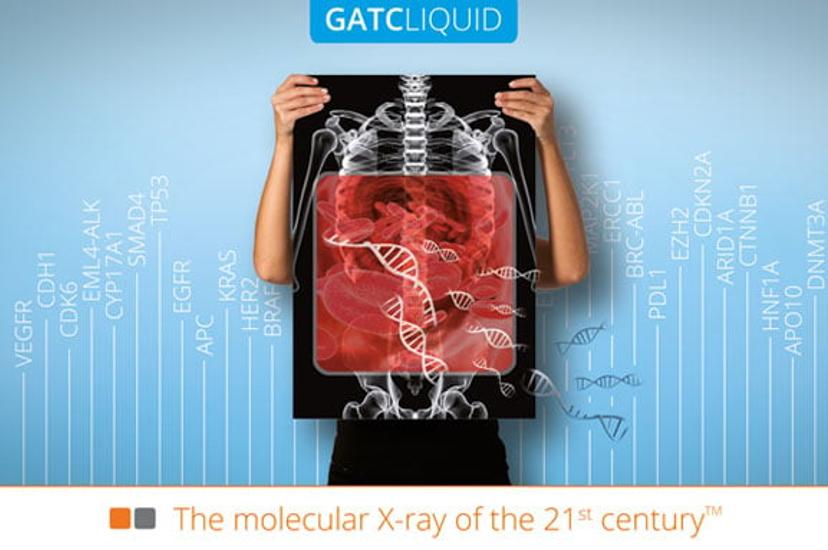GATC Discusses Its New Global Liquid Biopsy Service
New service gives all researchers exclusive access to liquid biopsy-based tools
4 Jan 2017

Dr Tobias Paprotka, Director of R&D, GATC Biotech
GATC Biotech recently announced the launch of its new GATCLIQUID service family. Sonia Nicholas, SelectScience®’s Clinical Editor, spoke to GATC’s Director of R&D, Dr Tobias Paprotka, to learn more about the service.
Cell free DNA analysis
SN: Can you tell us more about the service that you offer?
TP: The analysis of cell free DNA from blood has already resulted in the implementation of completely new diagnostic procedures in the field of prenatal testing. Since tumors shed DNA that contains tumor specific mutations into the blood stream, the analysis of cell free DNA for tumor diagnostics is very likely to be successfully adopted in the oncology field in the near future.
To explore this opportunity, GATC Biotech developed the GATCLIQUID service family, which was released early in 2016. The services offer clinical researchers the possibility to interrogate a whole range of tumor-related mutations that help to characterize a patient’s tumor with cell free DNA from plasma. GATCLIQUID offers exclusive access to liquid biopsy-based tools that can be flexibly used in clinical research and translational medicine.
SN: What is the GATCLIQUID service family?
TP: The GATCLIQUID service family includes three assays that are optimized for the analysis of circulating tumor DNA from blood samples.
GATCLIQUID ONCOEXOME enables the characterization of mutations in the coding regions of a cancer patient. Enrichment of the exome enables much higher coverage and therefore more sensitive detection of single nucleotide polymorphisms (SNPs), compared to whole genome sequencing. The product is recommended for detection of the whole range of cancer specific SNPs, including novel mutations, in a liquid biopsy sample. The service can also be used to compare these variations with the ones present in the solid tumor.
GATCLIQUID ONCOPANEL targets about 200 cancer relevant hotspots in 50 genes with over 5000 tumor mutations listed in the COSMIC database. The service can be used to gain a comprehensive analysis of tumor-specific mutations. The product has a higher sensitivity compared to ONCOEXOME, due to the efficient combination of single molecule PCR with next-generation sequencing.
GATCLIQUID ONCOTARGET is the most sensitive approach for interrogating single or a few important mutations in an individual cancer case. Based on droplet digital PCR (ddPCR), a specific mutation can be tracked with sensitivities as low as 0.1%. For some cancer entities, the superior sensitivity might enable early detection of cancer relapse and can be used for monitoring of treatment response.

The GATCLIQUID service family includes three assays that are optimized for the analysis of circulating tumor DNA from blood samples
Sample processing and technology
SN: Can you tell us more about how the technology works?
TP: Cell free DNA is highly fragmented and only present in very low amounts in plasma. Therefore, most protocols optimized for high molecular weight DNA are not successful. Our technology is based on protocols which were especially developed for the processing of cell free DNA. We perform a highly efficient DNA extraction from plasma, which is a requirement for a successful downstream processing. Our GATCLIQUID products are optimized for minute amounts of highly fragmented DNA, to ensure highest sensitivity in cancer SNP detection.
We started to optimize our protocols for cell free DNA already in 2009, for the extraction and analysis of maternal blood for non-invasive prenatal testing. Since then we have processed over 40,000 cell free DNA samples.
SN: What technology do you use for next-generation sequencing?
TP: We have all leading sequencing technologies in our own labs and we are certified service provider of Illumina as well as PacBio. The Illumina technology is most suitable for GATCLIQUID due to the very low sequencing error rate and ultra-deep coverage which is a prerequisite for achieving high sensitivities.
SN: Can you talk us through what happens when a sample arrives with you in your lab?
TP: Customers can send frozen plasma samples. Samples are barcoded and assigned to our proprietary Laboratory Information Management System (LIMS). Cell free DNA is extracted and processed further depending on the selected service. Thereby the sample is tracked and monitored throughout the whole process.
GATCLIQUID ONCOEXOME – DNA is isolated from plasma, a high complexity library is prepared, the exon regions are enriched, the library is sequenced and the resulting sequencing data undergo mapping, alignment and variant calling. The results are provided in a report and Excel tables.
GATCLIQUID ONCOPANEL – DNA is isolated from plasma, single molecule PCR amplification is carried out, the library is sequenced and finally data analysis takes place. The results are provided in a report and Excel tables.
GATCLIQUID ONCOTARGET – DNA is isolated from plasma, then amplification using droplet digital PCR is performed. The results are displayed in a report.
SN: Are you approved for diagnostic use? Which countries are you able to carry out tests for?
TP: Our GATCLIQUID service family is offered worldwide to every scientist in clinical research or translational medicine. All samples are processed under ISO 17025 accreditation and we have also ISO 13485 certification. The product is currently meant for research use only.
A unique service for clinical researchers
SN: What are the benefits to patients of the service that you offer?
TP: Recent research and publications raise the hope that analysis of cell free DNA can revolutionize the detection and diagnosis of a variety of tumor entities. However, both the composition and the very low amounts of cell free DNA make the analysis very challenging and the development of efficient protocols a difficult task.
We offer GATCLIQUID as “toolbox” for the detection of cancer specific SNPs in cell free DNA. The services can be used by scientists all over the world to obtain results that are produced with standardized workflows so that the data can be easily compared between independent labs.
The use of GATCLIQUID will facilitate the characterization of mutation profiles in cancer patients. With this knowledge, it might be possible to make treatment decisions based on cell free DNA analysis in the future. A simple blood draw with consequent analysis would be highly beneficial, especially for patients with tumors for which a tissue biopsy is painful or impossible to obtain. In addition, serial sampling to monitor the tumor treatment response and tumor development can be carried out with minimal discomfort and no clinical risk to cancer patients.
For some entities even the early detection of tumor formation or tumor relapse after surgery and treatment might be possible.
As the first service provider to offer clinical researchers easy access to liquid biopsy-based tools, these are exactly the kinds of questions we want to answer together now.
